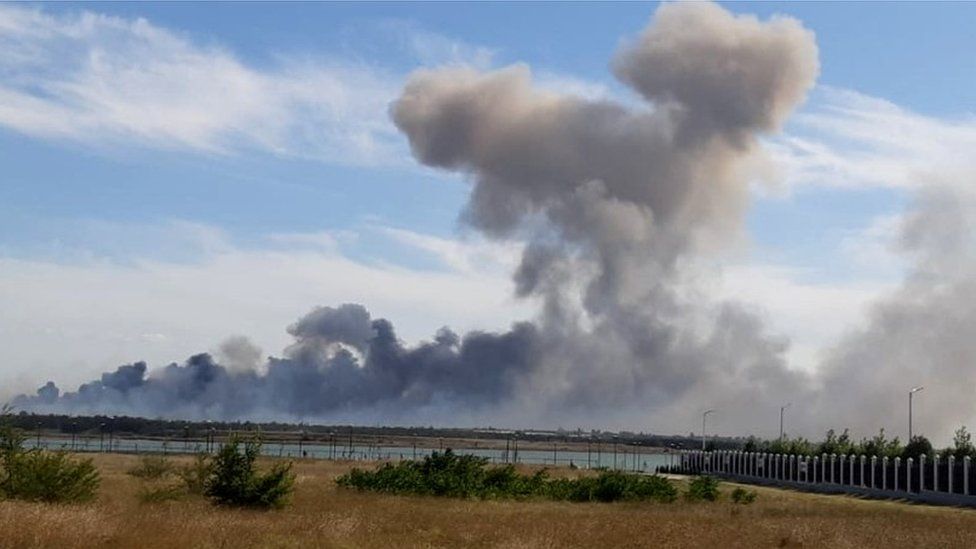Ukraine round-up: Blasts in Crimea and travel dispute
- Published

Russia used the Crimea peninsula as a launchpad to invade the rest of southern Ukraine in February - and unusually it was Crimea that was rocked by several explosions on Tuesday.
It is not yet clear what caused the blasts, which sent big black clouds billowing over a military airfield near Novofedorivka, on the peninsula's west coast.
The Russian-installed regional leader, Sergei Aksyonov, said one person had died in the blasts at Saky base. Local health officials say five people, including a child, were treated for injuries.
Video footage shows tourists on a nearby beach at the time fleeing in panic.
The Russian Defence Ministry said several rounds had exploded in an ammunition store and the airfield had not come under attack. But the BBC could not verify that claim. Ukrainian officials have made no suggestion that they caused the incident.
Russia annexed Crimea in 2014 - a move condemned internationally - and Ukraine has vowed to get it back.
Analysis by Chris Partridge, BBC weapons expert:
How could a strike have been carried out? The frontline is at least 225km (140 miles) away.
An attack by Ukrainian aircraft? The base in Crimea would be very well defended, with surface-to-air missile coverage making a conventional bombing raid unlikely. That leaves air-launched cruise missiles - but so far in this conflict we've seen no evidence of this from Ukraine.
What about ground-launched weapons? The Tochka-U ballistic missile's range is reckoned to be only about 75 miles. Longer-range missiles such as the Ukrainian-made Neptune could reach the target, but they have been used mainly against large warships; Ukraine claimed two of them sank the Russian guided-missile cruiser Moskva in April.
Western-developed Harpoon missiles are now in Ukraine, but these too are surface-to-ship.
The US Himars (High Mobility Artillery Rocket System) has been the recent talk of the conflict. It launches extremely effective GPS-guided rockets, but only to a stated range of around 50 miles. The US has shown reluctance to send longer-range munitions for Himars for fear of escalating hostilities with Russia.
Sabotage on the ground is a possibility - but so far things remain uncertain and we need more details to emerge.
Western entry ban on Russians?
Ukrainian President Volodymyr Zelensky urged Western nations to impose a blanket entry ban on Russians, arguing that sanctions on Russia needed to get tougher.
Russians should "live in their own world until they change their philosophy", he told The Washington Post.
President Vladimir Putin's spokesman Dmitry Peskov hit back angrily, saying "any attempt to isolate Russians or Russia is a process that has no prospects".
But Mr Zelensky drew support from the prime ministers of Estonia and Finland, who asked why Russians were still able to get EU Schengen tourist visas.
Direct Russian flights to the EU are banned, but Russians can travel to most of the EU overland - including via the Baltic states.
A general EU visa ban appears unlikely for Russians, beyond those already under sanctions for their links to the Kremlin and Russia's military. But the issue looks set to be raised again among EU ministers.
Russia launches Iranian satellite
Watch: Moment Russia launches Iranian satellite into space
An Iranian satellite was successfully launched on a Russian Soyuz rocket from the Baikonur cosmodrome in Kazakhstan - a mark of deepening Moscow-Tehran ties. They already have a close military partnership, notably in war-torn Syria.
There are Western concerns that Russia may use the satellite to spy on Ukrainian military operations.
Tehran says the Khayyam satellite will conduct scientific research and monitor Iran's borders and environment. It rejects the Western concerns, saying only Iran can access its information.
Russian oil cut hits Central Europe
The supply of Russian crude oil to three EU members - Hungary, Slovakia and the Czech Republic - has been suspended because of a dispute over the Druzhba pipeline, which crosses Ukraine.
Russian pipeline monopoly Transneft said Ukraine suspended the deliveries because Western sanctions prevented it from accepting transit fees from Moscow.
It is the latest blow in the EU's crisis over Russian energy supplies. The EU aims to phase out nearly all of its Russian oil imports, but those three Central European countries have limited options to get oil via other routes.
Meanwhile, Russia has reduced its gas deliveries to the EU - and the West accuses the Kremlin of weaponising its huge gas industry because of sanctions.